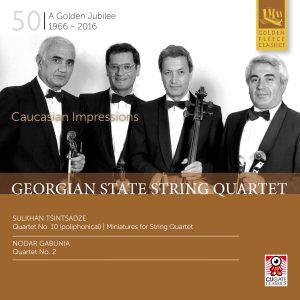 Facts &Figures
Facts &Figures
This release is the start of a new program line out of the CuGate Classics archives, the GOLDEN FLEECE CLASSICS. It is dedicated to the Georgian recordings the company made in the Nineties of the last century using already High Tech equipment for 24 bit /96 khz recordings. The Golden Fleece Logo with the galley refers to the saga of Jason and the Argonauts, which took place in the antique region of Kolchis, which is today’s Georgia. Our album comes on the occasion of the 50 years’ jubilee of the Georgian State String Quartet. It appears to be today’s oldest Quartet formation, whose members did not change. So they still play in the same scoring over all these years. Tamas Batiashvili, second violinist is the father of world famous violinist Lisa Batiashvili, who wrote a warm testimonial in the booklet. The repertoire played on this album is genuine Georgian music,
Sulkhan Tsintsadze made a major contribution to modern classical music, widely expanding its range of imagery. For this, his music has gone far beyond the confines of his country and gained renown and high acclaim abroad. He wrote 11 String Quartets and Quartet Miniatures. Although the composer himself thought of the miniatures as mere exercises in composition, one can notice in them the whole range of his individuality. Perhaps nowhere else Tsintsadze is getting as close to folklore as he does in these miniatures and later in his quartets, where folklore is creatively interpreted. Brilliant examples for this are the miniatures Gandagana, Kokhem, Fly Black Starling, Chonguri and Dance Melody. The Tenth Quartet occupies a special place among Tsintsadze‘s quartets. In this work, the composer casts his eye over the entire path he has travelled and meets with his favourite images. The two lines that reign in all of his quartets – the genre-mundane and the lyrical-psychological – are once more united here.
Nodar Gabunia, the famous Georgian composer and pianist, student of the Moscow State Conservatory with Alexander Goldenweiser (piano) and Aram Khatchaturian (composition) wrote his Second Violin Quartet in 1982 as a three-part cycle. The main thematic material is given in the first part. There are two themes at the base of the initial section of the exposition. One of them is artless, filled with graceful dancing, and the other is refined, internally very expressive and in an improvised style. Further development is constructed on a constant increase in tension. The second part takes us into the world of psychologically profound imagery. One can hear distinctly an original individual realisation of intonations and features of the polyphony of Georgian folk song. The final is filled with constant, uneasy movement, with transparent and sometimes harsh toccato.
The present release comes from the 24 bit /96 khz state-of-the-art recordings out of the CuGate Classics archive. They are carefully remastered by the prestigious Grammy award-winning b-sharp studio Berlin using the original source material. Liner notes in English. Series design will use pictures of the spectacular antique golden exhibits from the Golden Fleece Exhibition of the Georgian National Museum in Tbilisi. With respect to the occasion of the jubilee the current one uses an artist picture.
Georgian State String Quartet
In 2016 the Georgian State String Quartet celebrates its Golden Jubilee. It is hard to believe that a chamber music group persists for half a century without a break, staying still together as in its founding days. So this album is not only representative for their art of playing but also a deep bow before the life-time achievement of four dedicated musicians, who contributed a significant part to the international concert life but did never forget their roots, which are truly Georgian.
In 1966, the ensemble was founded by Konstantin Vardeli (Director and 1st Violin), Tamas Batiashvili (2nd Violin), Nodar Zhvanja (Viola) and Otar Chubinishvili (Cello), all of them graduated from the State Conservatory in Tbilisi and have since played in numerous orchestras. They are considered exceptional soloists whenever and wherever they play. As members of the Georgian State String Quartet they are known not only as outstanding interpreters of composed world literature but also as excellent performers of works by composers from the Caucasus region and especially those from Georgia. Thus the listener has the unique opportunity to hear native Georgians perform works of those composers from the Near East, who are unknown in the West. The Georgian State String Quartet first impressed the listening public with their high ranged interpretations at the 1973 Leo-Weiner-Contest in Budapest. Soon after that they won the Zakhary Paliashvili Prize, the highest musical honor in Georgia, and in 1980 they were named «National Artists of the USSR», the highest Soviet honor. They have won many other prizes worldwide as well. The four members of the ensemble are all professors at the State Conservatory in Tbilisi and live in their homeland.

